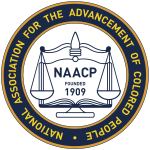
Back الجمعية الوطنية للنهوض بالملونين Arabic National Association for the Advancement of Colored People Catalan National Association for the Advancement of Colored People Czech NAACP Welsh National Association for the Advancement of Colored People Danish National Association for the Advancement of Colored People German Nacia Asocio por la Plibonigo de Koloruloj Esperanto National Association for the Advancement of Colored People Spanish National Association for the Advancement of Colored People Estonian NAACP Basque
 | |
| Abbreviation | NAACP |
|---|---|
| Formation | February 12, 1909 |
| Founders | W. E. B. Du Bois Mary White Ovington Moorfield Storey Ida B. Wells Lillian Wald Henry Moskowitz |
| 38-4108034 | |
| Legal status | 501(c)(4) Civic Leagues and Social Welfare Organizations |
| Purpose | "To ensure the political, educational, social, and economic equality of rights of all persons and to eliminate racial hatred and racial discrimination." |
| Headquarters | Baltimore, Maryland, U.S. |
Membership | 300,000[1] |
Chairman | Leon W. Russell |
President and CEO | Derrick Johnson |
Main organ | Board of directors |
Publication | The Crisis |
Budget | $24,800,000 (2019)[2] |
| Website | naacp |
| Part of a series on |
| African Americans |
|---|
The National Association for the Advancement of Colored People (NAACP)[a] is an American civil rights organization formed in 1909 as an interracial endeavor to advance justice for African Americans by a group including W. E. B. Du Bois, Mary White Ovington, Moorfield Storey, Ida B. Wells, Lillian Wald, and Henry Moskowitz.[4][5][6] Over the years, leaders of the organization have included Thurgood Marshall and Roy Wilkins.
Its mission in the 21st century is "to ensure the political, educational, social, and economic equality of rights of all persons and to eliminate race-based discrimination". NAACP initiatives include political lobbying, publicity efforts, and litigation strategies developed by its legal team.[7] The group enlarged its mission in the late 20th century by considering issues such as police misconduct, the status of black foreign refugees and questions of economic development.[8] Its name, retained in accordance with tradition, uses the once common term colored people, referring to those with some African ancestry.[9]
The NAACP bestows annual awards on African Americans in three categories: Image Awards are for achievements in the arts and media, Theatre Awards are for achievements in theatre and stage, and Spingarn Medals are for outstanding achievements of any kind. Its headquarters are in Baltimore, Maryland.[10]
- ^ NAACP2016AnnualReport naacp.org Archived August 8, 2014, at the Wayback Machine
- ^ "Charity Navigator – Rating for NAACP Empowerment Programs, Inc". www.charitynavigator.org. Archived from the original on August 21, 2021. Retrieved August 21, 2021.
- ^ "NAACP". Cambridge Dictionary. Retrieved August 22, 2023.
- ^ "National Association for the Advancement of Colored People | History". Encyclopedia Britannica. Archived from the original on April 30, 2021. Retrieved December 15, 2019.
- ^ Kwame Anthony Appiah, Henry Louis Gates, Jr., eds. Africana: The Encyclopedia of the African and African American Experience, in articles "Civil Rights Movement" by Patricia Sullivan (pp 441–455) and "National Association for the Advancement of Colored People" by Kate Tuttle (pp 1,388–1,391). ISBN 0-465-00071-1.
- ^ Foer, Franklin (March 4, 2024). "The Golden Age of American Jews is Ending". The Atlantic.
- ^ "NAACP History and Geography". Mapping American Social Movements Through the 20th Century. University of Washington. Archived from the original on May 10, 2017. Retrieved April 13, 2017.
- ^ "NAACP – Our Mission". Archived from the original on June 11, 2008. Retrieved September 5, 2008.
- ^ "NAACP". HISTORY. Archived from the original on May 15, 2021. Retrieved May 18, 2021.
- ^ "Contact Us". National Association for the Advancement of Colored People. Archived from the original on November 9, 2009. Retrieved November 17, 2009.
Cite error: There are <ref group=lower-alpha> tags or {{efn}} templates on this page, but the references will not show without a {{reflist|group=lower-alpha}} template or {{notelist}} template (see the help page).